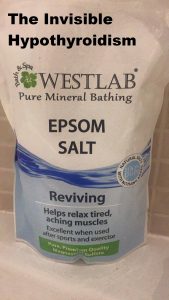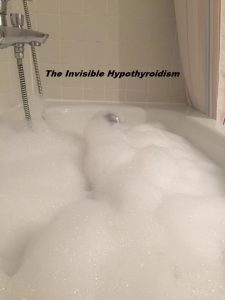Originally published on 20th December 2016 Last updated on 9th February 2024
Epsom salt usage is becoming increasingly popular, especially among those with thyroid conditions, and there’s good reason why.
I use Epsom salts once or twice a week in a bath, and as and when I feel I need it in a foot soak, too.
What Are Epsom Salts?
Epsom salt is actually magnesium sulfate, which therefore, makes it a great source of magnesium. Some thyroid patients will use these salts in a bath or foot soak instead of taking magnesium supplements. There is some belief that magnesium can be absorbed through the skin.
How are Epsom Salts useful for thyroid problems? Let’s explore below.
1. As a De-Stressor
A bath with Epsom salts can help you unwind and get ready for bed; relaxing muscles and leaving you feeling de-stressed. The magnesium in the salts relieve stress by promoting the production of serotonin and reducing the effects of adrenaline. Magnesium is also important in the production of energy and helping us to feel invigorated, but without feelings of restlessness or anxiety.
2. For Aches and Pains
Many thyroid patients (including myself) say that Epsom salts help their aching muscles and tired legs or feet, headaches and more.
With cold and flu season underway, you could try soaking in Epsom salts as it should ease muscle aches and pains and help you get a good night’s rest.
3. For Regulating Blood Sugar
Both magnesium and sulfate (Epsom salts’ ingredients) help to improve production and use of insulin too. Therefore, regular intake of them may help to regulate blood sugar, lowering the risk of diabetes.
(Although it’s important to still have a balanced diet and not use methods such as Epsom salts in place of one!)
4. For Magnesium Deficiency?
Thyroid patients may be more likely to be low or deficient in magnesium. Could taking an Epsom salt bath help this?
***
If you’re interested in giving this multi-use, loved-by-many Epsom Salt a go, I’ve put a link to it here.
Have you tried Epsom Salts? What did you think?
You can click on the hyperlinks in the above post to learn more and see references to information given.






